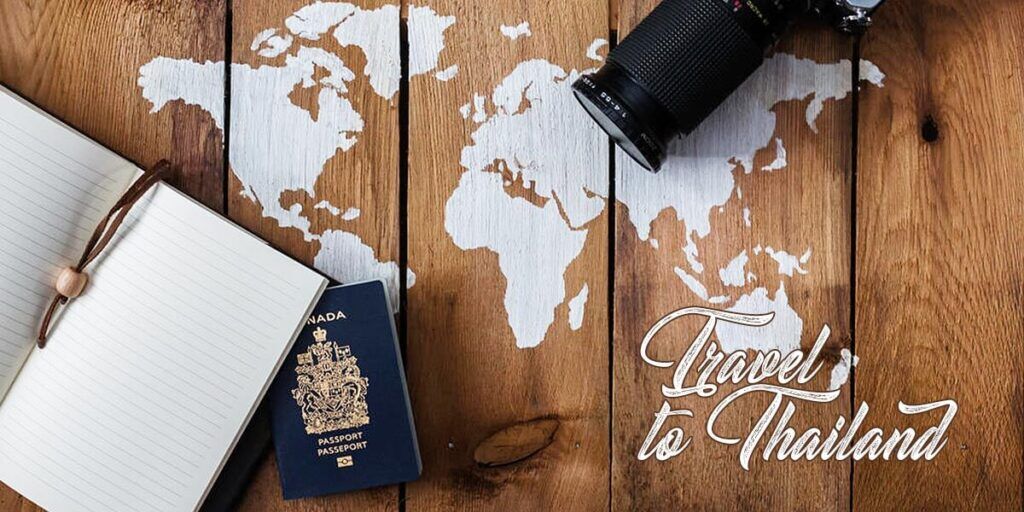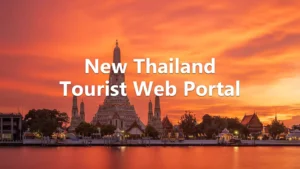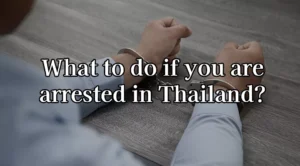People around the world love meeting Canadians. And jet-setting Canadians love being met! Before Covid-19, you could always pick a Canadian in the crowd by their big smile, constant “Ay”, and occasional apology. Canadians are respected for being polite and having a lot of fun. Thai people always enjoy hanging out with Canadians.
The pandemic put a stop to that. As countries locked down to curb the spread of the virus, traveling abroad was nigh impossible. If a Canadian wanted to visit far shores, they had to jump through hoops to meet entry requirements.
Well, the world is returning to normal and with a bit of planning, Canadians can leave the great white north and return to the tropics.
As of today:
- Canadians do not need to show proof of Covid Insurance.
- All mandatory hotel quarantine has been removed.
- Thailand Pass is no longer required for Canadian travelers entering Thailand.
- Vaccinated travelers do not need to provide proof of vaccination before arriving.
- Unvaccinated travelers (including children traveling with unvaccinated parents) need to complete an RT-PCR or Professional Antigen Test (Pro-ATK) test 72 hours before departing for Thailand. Proof does not need to be uploaded before traveling.
- Airlines and Thai Immigration will do random checks to confirm travelers meet Covid prevention requirements (vaccination certificate or Covid test).
- Wearing masks is no longer compulsory.
- The TM6 arrival card has been temporarily removed when entering Thailand.
With travel almost back to pre-Covid conditions, now is the perfect time to plan a holiday to your favorite destination.
Documents for Travel to Thailand
- Passport
- Visa (if required)
- Travel Insurance
- Flight Itinerary
- Hotel booking
- Vaccination record (if vaccinated)
- COVID-19 test result (if unvaccinated)
Correct documents will speed up the entry screening to Thailand.
Easy Steps To Enter Thailand from Canada
Apply for a Thai Visa
Canada – a Visa Exempt country
Canadian travelers love Thailand. They can visit Thailand without a visa through the Visa Exemption Program. Canadian citizens can stay in the country for up to 30 days as a tourist and can extend their permit to stay for a further 30 days at any local immigration office. This allows a Canadian to enjoy Thailand for up to 60 days.
If you want to stay in Thailand longer than the Visa Exemption allows, or are traveling for a purpose other than tourism, Siam Legal International offers various Thailand Visa services for travelers from Canada. You may check their services at: https://www.siam-legal.com/legal_services/thailand-visa-services.php
Long Term Visas for Canadians
Tourist Visa and Special Tourist Visa (STV)
Canadian citizens can apply for a Tourist Visa from the Thai embassy or consulate. There is a 60-day tourist visa that can be extended for additional 30 days, and the 90-day Special Tourist Visa (STV), which allows two 90-day visa extensions at the local immigration office. There are certain requirements needed for the STV, but it allows a visitor to stay in Thailand for up to 9 months. The STV will be available until September 2022.
Thai Elite Visa
If you wish to make Thailand easily accessible for many years to come or are perhaps thinking of relocating permanently, it is worth having a look at the Thailand Elite Visa.
The Thai Elite Visa allows a Canadian expat to live in Thailand for 5, 10, or even 20 years. Thai Elite members do not need to worry about some of the eligibility criteria needed when applying for other long-term visas.
The Thai Elite visa is exclusive and offers a host of benefits to holders. If you want to enjoy “Thai life” for the long term, you can read more about the Thailand Elite Visa.
Non-Immigrant Visa
Foreigners may also apply for a wide range of non-immigrant visas:
- Non-immigrant B Visa – for conducting business or employment
- Non-immigrant O visa – for visiting Thai spouse and family
- Non-immigrant ED visa – for students of recognized institutions in Thailand and their Parents or Legal guardian
- Non-immigrant O retirement visa – for those who wish to retire in Thailand
- Non-immigrant OA and OX visa – for those who wish to obtain a Thailand retirement visa for a long stay (it differs from type O visa)
Royal Thai Embassy, Ottawa
To apply for a long-term visa, please visit – Royal Thai Embassy, Ottawa website.
The Thai Embassy is in Ottawa. The address is 180 Island Park Drive, Ottawa, Ontario K1Y 0A2.
Thai consulates can be found in Vancouver, Toronto, and Montreal.
For assistance, please do not hesitate to reach out to [email protected] or 722-4444.
The above visas can be organized with a local Thai Embassy or Consulate in Canada. The process is simple, but the paperwork can be quite involved. There are companies that can help.
Siam Legal International is a reputable law firm in Thailand that offers visa assistance to Canadians. They are well versed in Thai immigration policies and processes. If you would like to streamline your long-term stay in Thailand, it is worth contacting them.
Vaccination status and entering Thailand
A Thailand Pass application is no longer required. Citizens from Canada can enter the country one of two ways.
- Vaccinated travelers – Vaccinated Canadian travelers do not need to complete any Covid tests before leaving Canada. They need to have a copy of their vaccination certificate when traveling. Children under 18 who are traveling with vaccinated parents do not need to complete any RT-PCR or Pro-ATK test before departing.
- Unvaccinated travelers – Before coming to Thailand, unvaccinated travelers will need to complete an RT-PCR or Professional Antigen (Pro-ATK) test through a clinic or medical professional. The test result must be issued within 72 hours before departing Canada.
An ATK (RAT) home test is not acceptable. Children under 18 who are traveling with unvaccinated parents also need to complete a test.
Airlines and Immigration will conduct random checks of passengers to confirm Covid requirements are met. It is best to have your Vaccination or Covid test Certificate available to show.
Book your Flight to Thailand
Flight lanes are open again. Whether you fly from Toronto or Vancouver, Carriers are taking to the air and offering excellent value to promote international travel after Covid.
Some common carriers for Canada to Thailand are:
- Air Canada
- Air Japan
- United Airlines
- Thai Airways
- Qatar
You can land at any international airport in Thailand and transit to other areas right away. There are no longer any “sealed” flights, though domestic flights may ask to see a vaccination certificate or test result before boarding. If you are traveling domestically, ATK self-tests are available at airports, pharmacies, and convenience stores.
Most international airlines follow the rules of the arrival country. It is best to check with the airline if you need to complete any tests before boarding.
Book a Hotel
Vaccinated travelers or unvaccinated travelers who complete a 72-hour pre-departure RT-PCR/Pro-ATK test are welcome to book any accommodation. There are no quarantine requirements. SHA+ quarantine packages have been removed from most booking sites.
If you see a “Quarantine Package” listed, you do not need to choose it.
To find and compare the best hotels available in Thailand, visit Agoda. They allow free booking and cancellation, confirm bookings with hotels and their web page is easy to navigate and compare hotels.
travelers have always needed to enter an address when traveling to Thailand. The accommodation can be a hotel, home, or a friend’s address. This would normally be entered on the blue arrival card (TM6), but you will see below that things are changing here too.
Organize your Travel Insurance
If you are a foreigner, purchase Travel Insurance. Though it is no longer an entry requirement, responsible travelers know the benefits of having insurance while traveling abroad.
Travel Insurance is something that is better to have and not need than need and not have. Travel insurance doesn’t just cover Covid. Comprehensive travel insurance will also cover:
- Medical emergencies
- Personal injury & accidents
- Missed or delayed flights
- Damage to belongings
- Loss of luggage
Canada has one of the best health systems in the world. Canadians and visitors alike receive free medical care. This is not the case in Thailand.
It’s important to know that foreign travelers cannot receive free medical care in Thailand. No matter the circumstance, if a Canadian citizen needs medical attention, they will need to pay for it. Depending on the severity, this could amount to thousands of dollars in out-of-pocket expenses.
There are multiple reasons to protect yourself when traveling. Visitors to Thailand often choose AXA Insurance Thailand because it is a trusted company that offers comprehensive insurance to travelers from around the world. Their policies are straightforward with good coverage.
Some advantages to AXA Insurance are:
- Recognized and trusted by Thai authorities and medical facilities.
- Easy to apply online and approved in minutes.
- Competitive pricing and cover.
- Has no 14-day waiting period and covers Covid-related incidents, including asymptomatic cases.
- Provides customers with a convenient 1-Page Certificate of insurance. This certificate contains all relevant information needed by medical professionals or if making a claim.
To see the coverage offered and organize your insurance to Thailand in minutes. Visit AXA Thailand.
Arriving in Thailand – Best Practices
It is easy to get to Thailand now. So what can you expect when landing? Here are a few things that will help you enjoy your trip and show respect to local Thai people.
Wearing Masks
Masks are no longer compulsory but still recommended when in public places. You see many Thai people (and visitors) still wearing masks when out and about. It is best to wear a mask when visiting restaurants or public venues. You will not get in trouble if you don’t, but it is a case of “do as the locals do”. It is about respect and consideration.
TM6 Arrival Cards
The Thai government has temporarily removed the need for visitors to complete the blue arrival card known as TM6. Their aim is to ease congestion at airports and remove another form that holiday makers need to complete. This initiative is in a testing phase, but it is hoped that the removal of TM6 will be successful and the change will become permanent.
Paperwork to Prepare
Though Thailand Pass is removed, and travelers do not need to provide proof before entry, it is best to prepare a few documents before arriving.
- Certificate of Insurance
- Vaccination certificate (vaccinated travelers)
- 72-hour RT-PCR or Pro-ATK test result (unvaccinated)
- Covid-19 recovery certificate (if previously tested positive)
This will speed up your processing time before leaving your country, or if asked to provide vaccination or testing proof in a random check. These documents can be presented in digital form, but airlines, Immigration, and Health Officers will appreciate the extra effort if you print them.
Thailand and Canada are chalk and cheese. Canada has a diverse cultural background and is so large that one side can feel different from the other. But Thailand is in the tropics. Its Asian history, culture, cuisine, and geography are unlike anything you will find at home. Thailand is loved because it offers people a unique experience for a fraction of the cost. With some forethought, the friendliest Westerners can visit Thailand and share a smile, a laugh, and a meal with the friendliest Asians.











































One Response
I am a Canadian and plan on visiting a number of countries in Southeast Asia this spring. I will be travelling from Cambodia to Thailand. Do I need any special document (visa?) as a Canadian entering Thailand from a third country?
Thank you for any advice.